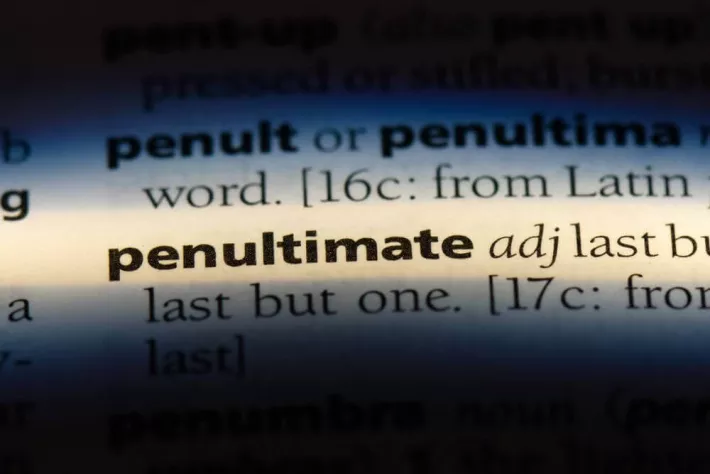It’s not uncommon to see people misuse the word “penultimate” to describe something as better than the best, even more ultimate than ultimate, but it actually means “the next to last.”
'Penultimate' comes from a Latin word that means 'almost ultimate.'
“Penultimate” comes from a Latin word that means “almost ultimate,” so the next to last book in a series, the next to last day of a vacation, and the next to last game in a player’s career are all penultimate items or events.
“Penultimate” is not the best of the bunch or the last of something; it is the second-best of the bunch or second-to-the-last of something.
- Squiggly won the penultimate prize in the raffle. (That would be the second to last prize in the raffle.)
- Aardvark’s team is preparing for the penultimate game of the season. (That would be the team’s second to last game of the season.)
From the television version of “The Hitchhiker’s Guide to the Galaxy”:
Believe me, ladies and gentlemen, there is nothing penultimate about this one. This, ladies and gentlemen, is the proverbial it. After this, there is void… emptiness… oblivion… absolute nothing.
Origin of ‘Penultimate’
“Penultimate” was actually a noun before it became an adjective. According to the Online Etymology Dictionary, “penultimate” referred to the “next to the last syllable of a word or verse.” For example, I found an old dictionary from the 1800s that instructed people to “accent the penultimate” when explaining how to pronounce Greek and Latin proper names.
The Latin prefix “paene-” (shortened here to “pen–”) means “almost” or “nearly.” It’s not very common anymore. Most words that use it now are obscure or rare (for example, “peneseismic” means regions where earthquakes occur only rarely or only of small magnitude, so it means something like “nearly seismic”), but one word still in common use is “peninsula,” which means “almost island.” A peninsula is a piece of land that is almost surrounded by water.
Another word from the same root that you might have heard, especially if you have watched an eclipse, is “penumbra.” “Umbra” means “shade or shadow,” so a penumbra is almost a shadow or a partly shaded area. During a total solar eclipse, the total eclipse is only visible from certain parts of earth that are properly aligned to see it. Those people are covered by the “umbra”—the shadow. But people outside that region still see a partial eclipse, and they are said to be covered by the “penumbra”—the partial shadow.
So the next time you want to describe something that is the best, simply call it the best or the ultimate—the ultimate prize in the raffle—not the penultimate prize.
Mignon Fogarty is Grammar Girl and the founder of Quick and Dirty Tips. Check out her New York Times best-seller, “Grammar Girl’s Quick and Dirty Tips for Better Writing.”
Image courtesy of Shutterstock.




